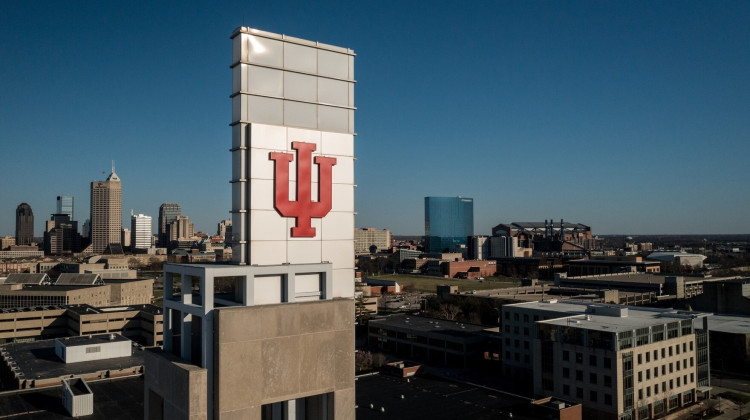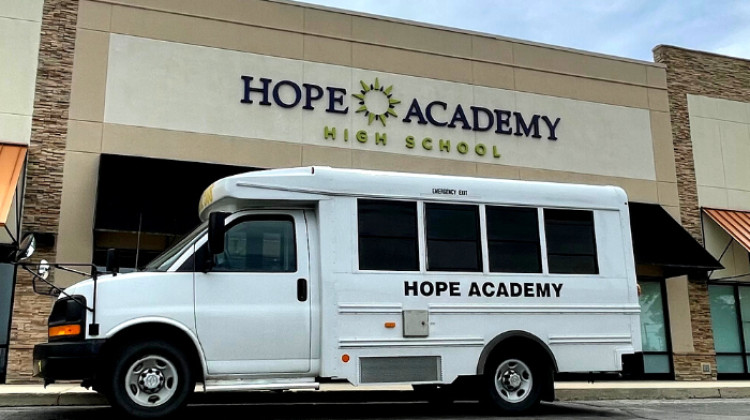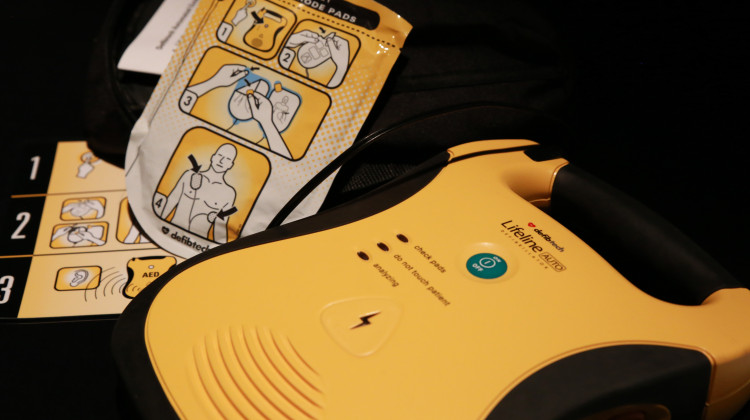
Worker stands at a COVID-19 testing center at IU Bloomington on Sunday, Aug. 9, 2020.
Eric Rudd/Indiana UniversityAs colleges across the country welcome students back to campus, incoming freshmen are starting college in the middle of a pandemic. And, many are struggling with a tough decision to start or defer college this fall.
Hundreds of thousands of students are heading back to campus, even as the COVID-19 cases rise in many states. And while young people appear to be less likely to develop serious symptoms from COVID-19, there are still fears of passing the disease to more people and putting a strain on the country’s already limited testing capacity.
'Not too overwhelming'
LeAnne Bugay is a freshman at University of Nebraska-Lincoln. She’ll will live on campus this semester.
“I like the University of Nebraska-Lincoln's plan so far because they've definitely given out specific information but I feel like it's not too overbearing,” Bugay says.
Bugay says she didn’t want to put her education on hold for the pandemic.
“I really like school and I like to socialize,” Bugay says. “So I definitely would have had some fear of missing out if I would have stayed home.”
Indianapolis-native Anya Heminger is going to live on Indiana University’s campus. Her family has taken the virus really seriously, she says, but Heminger is worried some of her peers may not follow public health guidelines.
“I'm hoping that everyone will be following the rules that are going to be set in place by the campus, wearing masks everywhere that we're going and making sure to not have large gatherings and just being safe in general,” Heminger said. “I'm really hoping that people will take it seriously.”
Heminger decided to live on campus even though all her courses are online, because she hopes to get involved with other activities on campus, like the student newspaper.
“I'm kind of worried about the fact that I'm going to be online like, ‘Am I making the right decision with still going to campus and all of my classes being online?’” Heminger said.
Not what she expected
Just as anxious is Indiana University freshman Rama Sardar, who said she knows this fall semester won’t be the college experience she expected.
“I think students are definitely allowed to be upset. I mean, we're being robbed of so many experiences,” Sardar said. “But I think at the end of the day, we need to understand what we do have, so I'm just trying to take in what I can.”
Sardar is also hoping to avoid being sent home. In Monroe County, where Indiana University is located, young people are already leading the rising number of cases, according to data from the state health department.
“So I'm definitely scared about students not taking this seriously,” Sardar says. “Because I feel like if we don't take it seriously, we'll get sent back in like October.”
Forced to pivot?
Thomas Duszynski is director of epidemiology education at Indiana University Purdue University Indianapolis. He said there’s a real possibility colleges will be forced to pivot to online-only education -- especially if students and others on campus don’t use masks and practice social distancing.
“The reality is I am 100% prepared -- I think as most faculty are -- to pull back and say let's just go all virtual,” Duszynski said.
Duszynski said there isn’t really isn’t a one-size-fits-all approach for tackling COVID-19 on campuses, but there are a few key things that public health experts have been saying all along: Wear a mask, wash your hands and physically distance. If someone tests positive, isolate that person and trace their contacts.
“That's where each campus or each school has to kind of weigh their own ability to do this,” Duszynski said.
The University of Illinois requires all students and staff to be tested for COVID-19 twice a week. A study from Harvard and Yale suggests that is the minimum threshold to safely open. Indiana University officials say they can’t meet this capacity, but every student living on campus will be tested upon arrival and then randomly throughout the semester.
Experience she doesn't want
It’s the unknowns that led Illinoisian Haven Dager to put off going to University of Missouri this semester. Mizzou is starting in-person classes this fall.
“It's all a money grab and I don't really want to be a guinea pig to all of that for fall semester,” Dager said.
Plus, Dager expects the university will pivot to online classes anyway.
“It all just comes down to like, you know, I'm just wasting my money,” Dager says. “Wasting it on a university that just is just pulling cash from my bank account just to give me an online college experience that I really don't want.”
This story was produced by Side Effects Public Media, a news collaborative covering public health.
 DONATE
DONATE






 Support WFYI. We can't do it without you.
Support WFYI. We can't do it without you.